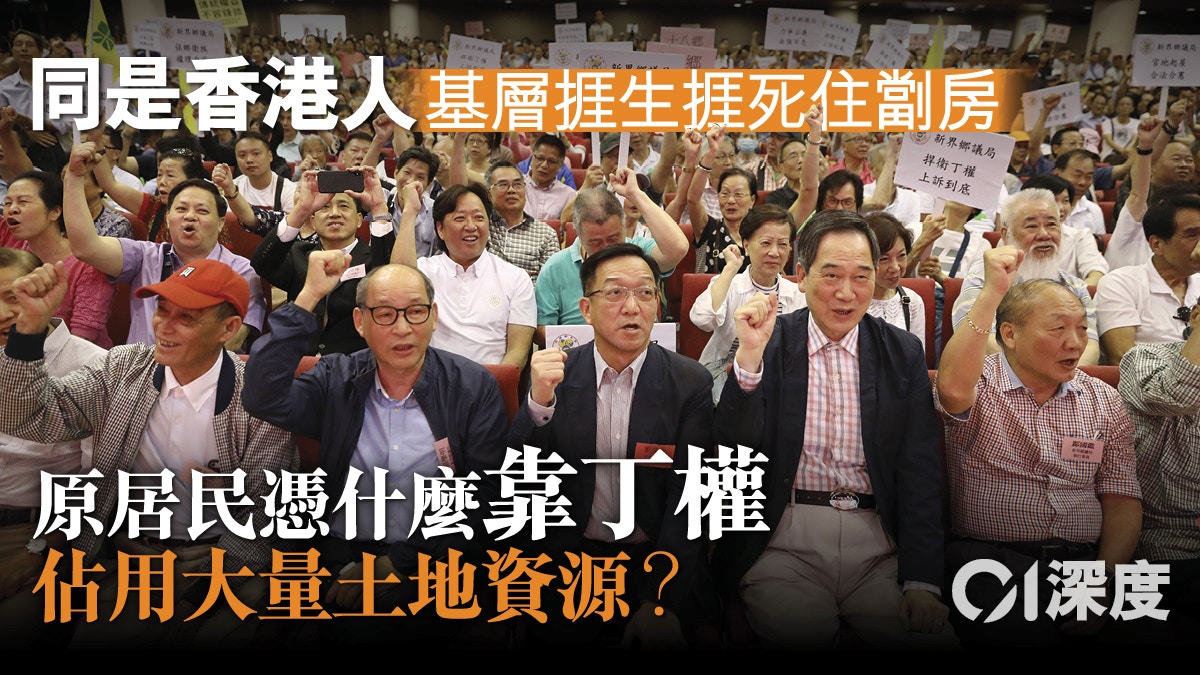weekly
Written by: Cheng Xue
2021-01-25 17:30
Last update date: 2021-01-25 17:30
The Ding Quan issue has entangled Hong Kong for many years.
The High Court ruled in the Judicial Review of Ding Power the previous year that after the construction of a small house in the form of a private agreement or land exchange was unconstitutional, the three parties involved in the case filed separate appeals; two years later, the High Court's Appeals Chamber overturned the original case earlier (January 13) The court ruled that the government and the Heung Yee Kuk won the case, that is, the construction of small houses in the form of a private agreement, land exchange, and application for a free building license are all constitutional.
The losing "Cheung Chau Review King" Guo Zhuojian stated that he would appeal to the Court of Final Appeal. The final result is still uncertain, but "Hong Kong 01" has long been repeatedly raised that there are three major problems with the small house policy-doubts about the rationality of privileges, which is harmful to social justice There are frequent chaos such as "small house", "flying house", and small house speculation, and Ding's rights have been reduced to a profit-making tool. The land problem in Hong Kong is severe, and the small house policy has also become a constraint.
The SAR government has been helpless for many years because of its vested interests.
Guo Zhuojian and social worker Lu Zhiheng filed a judicial review on Ding Quan and the small house policy.
(Profile picture)
Small houses are short-term measures
According to the "New Territories Small House Policy" of 1972, male indigenous residents of the New Territories who have reached the age of 18 can build small houses in three ways: if the indigenous residents own private agricultural land, they can apply for a building license to build small houses without paying land premium; Residents can also exchange land with the government at a discount or free of premium to build small houses; if the original residents do not have farmland, they can have two-thirds of the market value and require the government to grant government land through a private agreement.
It is worth mentioning that the small house was originally a "temporary housing policy". The Information Services Department announced that the policy is only a "transitional arrangement" to improve the living and sanitary conditions of residents in the New Territories, while complementing the development of rural areas in the New Territories. Comprehensive plan; however, since the implementation of the "New Territories Small House Policy" in 1972, it has become a special right of unfair distribution, and it has gradually been abused, even causing problems such as "spotting" and "flying".
Even though the New Territories Civil Affairs Department conducted an internal review in 1977, it has shown that the small house policy was seriously abused, but due to historical reasons, the authorities did not immediately terminate this unfair policy.
In 2015, "Cheung Chau Review King" Guo Zhuojian filed with the court for judicial review of Ding Quan.
In April 2019, the High Court ruled that the original residents’ application for small houses on private land is a legitimate traditional right protected by Article 40 of the Basic Law, but it is illegal to apply for small houses through private agreements or land exchanges.
The verdict means that the 932 hectares of "Rural City Planning Development Zone" reserved by the government for the construction of small houses for the indigenous residents of the New Territories should be released to benefit all Hong Kong citizens.
According to research conducted by the Local Research Institute, it includes 32 hectares of land preparation, each of more than 5,000 square feet, which has the potential to develop into public housing or social welfare facilities.
However, this time the government appealed to the Heung Yee Kuk, and the 932 hectares of "idle government land" will be unfrozen and allowed to apply for small houses. Another group estimates that in order to cope with the increasing number of small house applications, the government may reserve in the future More land, including land under the Rural Expansion District Plan.
It can be said that at the moment when the land problem is in dire straits, the small house problem that has been entangled in Hong Kong for more than 40 years will not be solved, and there will be endless troubles.
The small house was originally a "temporary housing policy," and the Information Services Department announced that the policy was only a "transitional arrangement."
(Profile picture)
First, there are doubts about the rationality of privileges, which is detrimental to social justice.
Article 40 of the Basic Law stipulates that "the lawful traditional rights and interests of the indigenous inhabitants of the "New Territories" shall be protected by the Hong Kong Special Administrative Region."
The controversy surrounding the small house policy, from a legal point of view, focused on whether Ding's rights belong to "legitimate traditional rights and interests."
In the past, public opinion criticized that only male indigenous inhabitants enjoyed the right to Ding, which was suspected of discriminating against women. Indigenous residents not only enjoyed the privilege of building houses without paying land premiums, but under certain circumstances they could apply for public housing and enjoy dual rights.
Both of them not only violated Article 25 of the Basic Law, "All residents shall be equal before the law," and they do not comply with the provisions of the International Covenant on Civil and Political Rights and the Hong Kong Bill of Rights Ordinance that guarantee equality.
The ruling mentioned that Ding Quan has always been recognized and regarded as legal, and the drafting of Article 40 of the Basic Law took into account that the small house policy is a "legitimate traditional right"; he also stated that the trial judge referred to land exchange and private agreement The two methods of granting land to build houses have no traceable history. This understanding is incorrect. These two methods are customary tenure.
As for the issue of the right to discriminate against women and non-indigenous inhabitants, the ruling stated that the Chinese and British governments signed the International Convention on the Elimination of All Forms of Discrimination against Women, and the two countries respectively offered exemptions for the small house policy; in addition, Article 40 of the Basic Law The article also considers immunity from relevant discrimination.
The verdicts issued by the local research agency are open to discussion.
First of all, although there are international cases that allow it to exist, it is necessary to consider whether it is necessary, justified, and proportional.
The court did not explain this.
What's more, even if the "Hong Kong Bill of Rights Ordinance" passed in the 1990s considers exemption from the right, whether there should be room for improvement as society changes.
Secondly, the local research agency also pointed out that there are no documents to show that the Basic Law Drafting Committee had always believed that Ding Quan was a "legitimate traditional right." The appeal court said it was conclusive, but its evidence was insufficient.
Small houses in the New Territories have long been restricted to "self-occupation" purposes.
Between 2012 and 2017, nearly half of the small houses were resold within five years of completion.
(Profile picture)
Second, chaos appeared frequently and Ding Quan became a profit-making tool.
According to policy documents and press announcements during the British-Hong Kong period, the small house policy aims to improve the living environment of residents and is a transitional measure to provide residents with stable and autonomous homes.
Time has changed, and small houses in the New Territories are no longer limited to "self-occupation" purposes.
Although the government prohibits the original residents from transferring the rights of small houses and restricts the sale of small houses, the current policy is only to re-sell small houses within five years to make up for the land price. After five years, they can buy and sell freely, with limited efforts.
According to information from the Lands Department, an average of 971 small houses were completed each year from 2012 to 2017, and 462 small houses were resold at the same time.
In other words, nearly half of the small houses were resold within five years of completion. This figure does not include small houses that were sold at a premium after five years of completion.
In addition, due to the limited land, the original residents who have the right to do so may not be able to build small houses, so some developers have privately purchased the right to small houses from the original residents, hoarding a large amount of rural development land to build small houses and resell them for profit.
It can be seen that the small house policy not only deviates from the original intent of "self-occupation", it has even become a profit-making tool for developers.
Ordinary citizens can struggle to get upstairs after working hard all their lives, and the disadvantaged are even waiting for public housing. Male indigenous residents of the New Territories have a small house right from birth.
(Profile picture)
Third, the land problem in Hong Kong is severe and the small house policy is also a constraint.
The problem of land and housing has always been the first of many difficulties faced by Hong Kong society. Ordinary citizens can only struggle to get upstairs after working hard all their lives. There are even more vulnerable people living in sub-divided housing waiting for public housing. Male indigenous residents of the New Territories have a small house right from birth. ; Fewer people have more rights, it is inevitable to accumulate social grievances.
"Hong Kong 01" has repeatedly emphasized that Hong Kong does not lack land, but lacks a government that dares to break the existing profit distribution pattern and is determined to redistribute land resources-this is especially reflected in the small house policy.
For example, the 932 hectares of "Rural City Planning Development Zone" mentioned above. Although these land covers the whole Hong Kong and may not be directly used for the development of large-scale communities, many of them have the potential to develop into public housing or welfare facilities. Others Scattered small plots of land can also be used for flexible land use planning and rural development.
However, the result of this ruling means that the land needs to maintain the use of "idle government land", which not only cannot benefit the entire population of Hong Kong, but also imposes constraints on the government's planning of land development in the New Territories.
Tracing back to the source, Ding Quan is not only a legal issue, but also a political issue.
Therefore, the government cannot expect to do nothing but rely on the courts to analyze the meanings of the provisions of the law; instead, it should actively intervene through administrative means and even ask the National People's Congress to interpret the law to clarify the contradictions in the provisions of the Basic Law.
Ding Quan has continued to this day. It was caused by the previous government's compromise and concession and Xiao rules and Cao. The interests of which nourished a large number of vested interests, but the bitter fruit of the result has to be swallowed by ordinary Hong Kong citizens.
The answer is self-evident as to what choice the government should make between those with vested interests and ordinary citizens.
The problem of abuse of power has been delayed for many years, the government must legislate to severely punish them
[Ding Quan Review Case] The policy deviates from the original intention, the government should reflect on three major lessons
Interpretation of Dingquan Review Case and Rethinking the Unfairness of Small House Policy
Freeing up land for housing planning cannot be delayed, the government must eventually face the issue of "rights"
Ding Quan Youth Housing Policy Subsidized Housing Department Public Housing Subsidiary In-depth Report




/cloudfront-eu-central-1.images.arcpublishing.com/prisa/RFXKLPJ6S5PGXJYGTELOFX5R6E.jpg)

/cloudfront-eu-central-1.images.arcpublishing.com/prisa/OV2VBR4SENF6HBYT4PL7REJMVU.jpg)

